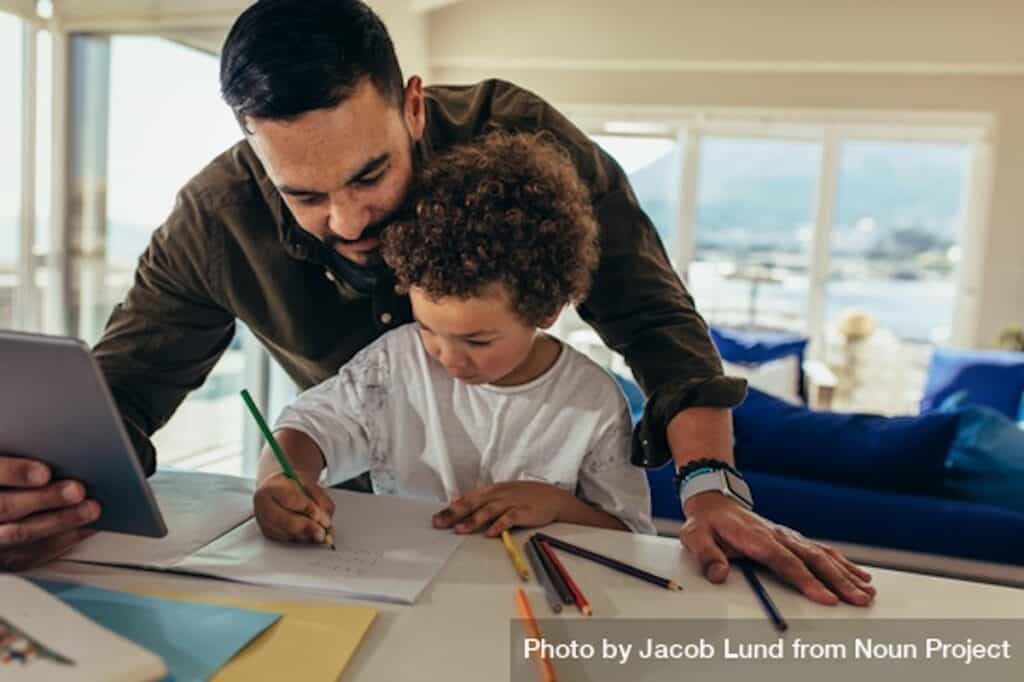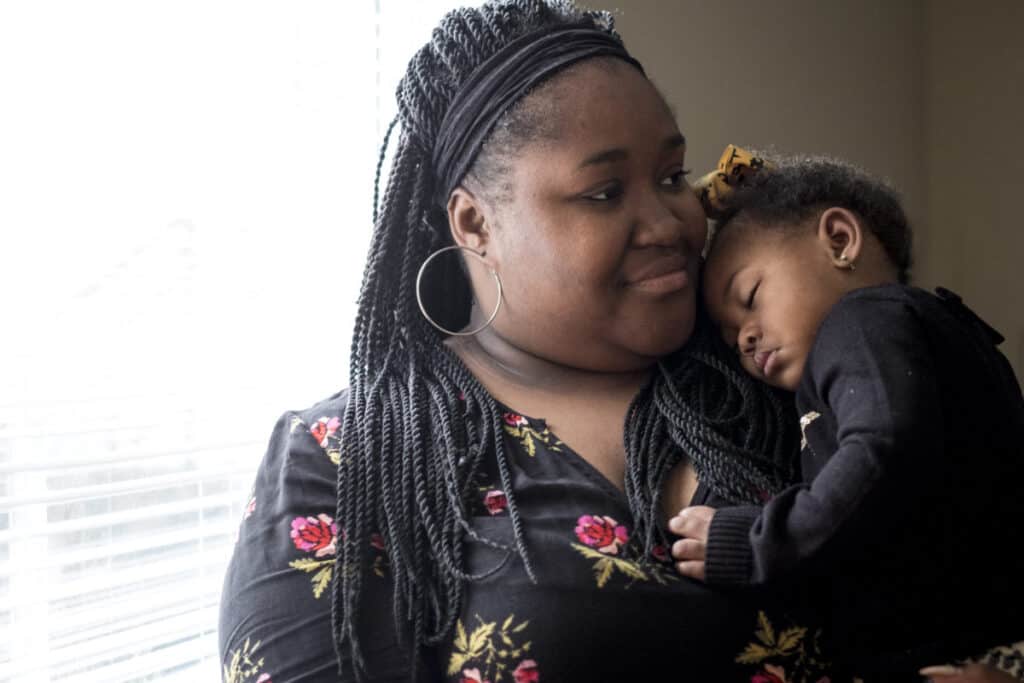If your child is struggling in school, there could be many different reasons. Your first step should be to work with the school to identify the problem. Then, depending on what that problem is, you can explore the best way to help. Read on to learn how to help a child who is struggling in school. We’ll cover working with the teacher and how to practice at home.
Let’s first look at some initial solutions for different challenges. These are places to start while the school assesses progress as they try some new strategies. But if your child continues to struggle, the school should do an evaluation to check for disabilities. Then, if your child qualifies, you will start the special education process and create an Individualized Education Program (IEP).
Find solutions based on the problem
If your child needs a different kind of teaching:
Children learn in different ways and some kinds of instruction work better for certain kids.
If a mismatch in teaching and learning style is the cause of your child’s trouble, some new teaching strategies–or interventions–can help! The process of trying out new strategies is called Response to Intervention, or RTI. An example is small group instruction: a few kids work in a group with the teacher to get more personalized instruction for part of the class.
Ask the teacher what kind of classwork your child responds to best. Maybe they can try to use more visuals, listening activities, or action-based work with your child.
Your school has a whole menu of strategies, or interventions, that teachers can try. But if they don’t help, there are other options.
If your child is facing non-academic challenges at home or in school:
Many kids struggle in school because there are other things going on in their lives. For example, if they miss a lot of school due to illness, are just learning English, or are getting bullied in school. In these cases, you need to explore the problem with the teacher and school counselor. Solutions may include tutoring, counseling, focused classroom management, or other creative ideas to support your child’s emotional health.
If your child has a learning disability:
If your child has a learning disability like dyslexia or dysgraphia, there are special teaching techniques that are specific to the type of disability. If the teacher has tried some general interventions and your child doesn’t make progress, you should get an evaluation and ask specifically to test for learning disabilities. If your child qualifies, they can get services from special education teachers who are trained in the specialized techniques.
If your child has a developmental disability:
Developmental delays or disabilities can also affect learning. Kids can have specific kinds of delays that affect their communication, motor coordination, or ability to regulate their emotions. These can all affect learning.
There are special therapies to help kids with developmental disabilities. Examples are Speech Therapy, Occupational Therapy (OT), and Behavioral Therapy.
If your child has trouble focusing:
There are some simple ways to reduce distractions and help kids focus. Examples include putting their desk up front near the teacher, doing individual work in a quiet corner with dividers around their desk, or using headphones to cancel noise.
- An evaluation can tell if a child has ADHD (Attention Deficit Hyperactivity Disorder). This is a condition where their brain processes things differently. If a child has ADHD and it affects their learning, they should qualify for special education services. There are strategies, medicines, and resources that can help children with ADHD. (More about ADHD therapy and ADHD medicines)
- You may also hear the term ADD: Attention Deficit Disorder. This is similar to ADHD but without the hyperactive or impulsive elements.
Find the right interventions
The teacher and school should suggest specific interventions (new teaching strategies) to help address your child’s learning needs. You and the school can decide together what may work best.
They can also suggest accommodations. These are adjustments to the classroom environment to remove barriers that make it hard for your child to learn. These may be things like a certain placement of their desk to reduce distractions, frequent breaks, or extra time to take tests.
Once the interventions are in place, it’s important to monitor your child’s progress to see if they are helping.
How to keep track of your child’s progress:
- Ask the teacher how they are assessing your child from week to week. They should have a system in place to do this, and you should be seeing the results
- Get the reports from the assessments and make sure you understand them
- Check in with the teacher every 2 weeks to ask about your child’s progress. The curriculum-based assessments should tell you if they are making progress
- Keep in touch with the teacher and your child. Ask regularly about progress
- Watch your child do their homework and ask about what they are learning. Stay involved!
- Talk to your child about how the new teaching strategies are helping (Make sure the interventions are happening! For example: “Are you working in your small reading group every day? How is that going?”)
What if the interventions are not helping?
- Talk to your child’s teacher. Ask them to adjust the intervention. There are many different things they can try. If one strategy is not working, they should try others
- If your child is not making progress in 2 months, ask for a special education evaluation. You can do this while the interventions are going on
- Don’t wait too long. The school year is shorter than we think. If your child is not keeping up, you want to catch it quickly!
Special education and the IEP
If your child is still struggling after trying new interventions, you may need to do a special education evaluation to find out if they have a learning disability, a developmental disability, or ADHD. If the evaluation points to one of these conditions, your child should qualify for special education services, and you will create an Individualized Education Program (IEP).
If you create an IEP, make sure it includes working with a specialist who is trained in your child’s specific type of disability.
The school’s responsibilities for children with disabilities
A child with learning disabilities needs help from both the school and parents. Here are some of the school’s responsibilities for how to help a child who is struggling in school.
All schools should do these 3 things:
- Provide high quality instruction to all students
- Identify disabilities early and accurately
- Provide specialized education, support, and services to children with disabilities
If a child is struggling in school, the school should…
- Do regular performance assessments (tests)
- Review the data from these tests
- Set up regular meetings and communicate with you clearly
If these tests show that your child is not meeting the standards for their grade level, the school should…
- Start using educational interventions and new approaches
- Keep testing your child’s progress regularly
- Communicate with you clearly about your child’s progress
If those changes don’t help after 1-2 months, the school should…
- Give your child a complete evaluation to see if they have a learning disability (Note: they should respect a parent’s request for an evaluation anytime if there is a concern about a disability)
If your child qualifies for special education services, the school should…
- Work with you to create an Individualized Education Program (IEP)
- Provide specially designed instruction as described in the IEP
If you’re in Louisiana:
Louisiana Schools have systems and guidance in place to ensure a high quality education to all students, including those with disabilities.
Their approach has 3 tiers, or levels:
#1: High quality curriculum for all students
- All students should be getting high quality teaching using a curriculum that has been shown to be effective
- Each school district can choose its own curriculum out of a list of choices approved by the Louisiana Department of Education
- The school should do regular assessments to make sure a student is making progress
- If they are not, the teacher should start adding some strategies or specialized teaching techniques that are designed to help the child with their particular challenge (#2)
#2: Interventions to support children who are not progressing
- There is a wide range of strategies and specialized teaching techniques that are designed to help children who struggle in different areas of learning
- If your child is not making progress, their teacher should be able to identify which strategies may work for your child and start trying them right away in the classroom
- There is a system in place to help teachers in all districts do this
- If the new strategies don’t work after a period of time, your child should get an evaluation to see if they qualify for Special Education services. In some districts this is called ESS: Exceptional Student Services
#3: Specialized teaching and other services for students with disabilities who cannot make progress otherwise
- This is Special Education (In some districts this is called ESS: Exceptional Student Services)
- It may include specialized teaching and other services like therapies (speech, occupational, physical, or behavioral therapy)
- Your child will have an evaluation to see if they have a disability that qualifies them for these services
- If they qualify, you will work with the school to create an IEP: an Individualized Education Program
Strategies for Success Guidebook
The Louisiana Department of Education created a 22-page guide called Strategies for Success: A Guidebook for Supporting Students with Disabilities.
This outlines what all school districts in the state intend to do to help students.
Here is an adapted list of what Louisiana schools say they should be doing:
- Know your child’s challenges and needs
- Identify and do the assessments that are appropriate for your child
- Identify classroom interventions to help them if they are not learning at grade level
- Monitor their progress regularly and make adjustments to the interventions if they are not working
- Keep open communication with you: explain all testing results, interventions, and options clearly and make sure you understand them
- Evaluate your child for learning disabilities if they are not making progress with the interventions
- Create an Individualized Education Program (IEP) for your child if they qualify
- Follow your child’s IEP if they have one: provide all instructional supports and services listed
*************************************
How to help your child at home
Of course, your support at home can also be a big help if your child is struggling in school. Here are 3 ways to help:
Help your child gain confidence
Having trouble in school can have a big effect on a child’s emotional health. It’s important to keep an eye on this and give them praise and encouragement.
It’s hard for a kid to see others reading longer, harder books when they are struggling with simpler ones. Or to get low grades or comments on writing assignments when they don’t know why. Many students come to believe they’re not smart. This can start a dangerous slide into a stretch of low self-esteem that can last years and affect many parts of their life.
Self-esteem is when a person feels confident that they can do something well. Low self-esteem is a big problem and often comes from having trouble in school. But you can help your child avoid this path.
Here’s what you can do:
Be encouraging, not critical.
- Kids who struggle in school are often pretty sensitive about it. Criticism can be devastating
- Be realistic but point out the positives (“I know you missed some answers, but you’re learning how to do these kinds of math problems”)
- Remind them that it’s the effort that counts: all they need to do is try their best
- Praise them for things they do well and when they get through a difficult task
- Recognize effort, not whether it’s right or wrong (“Wow, you’re working so hard!”)



